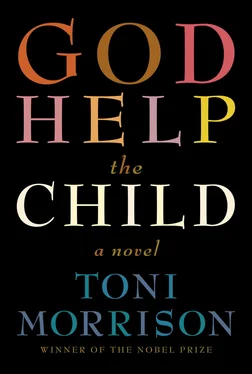Only during the long months when no one knew where Adam was did the family conferences and sumptuous breakfasts stop. During those months quiet ticked through the house like a time bomb that would often explode into quarrels, silly and pointlessly mean.
“Ma, he’s looking at me!”
“Stop looking at her.”
“He’s looking back!”
“Stop looking back.”
“Ma!”
When the police responded to their plea for help in searching for Adam, they immediately searched the Starberns’ house — as though the anxious parents might be at fault. They checked to see if the father had a police record. He didn’t. “We’ll get back to you,” they said. Then they dropped it. Another little black boy gone. So?
Booker’s father refused to play even one of his beloved ragtime, old-time, jazzy records, some of which Booker could do without but not Satchmo. It was one thing to lose a brother — that broke his heart — but a world without Louis Armstrong’s trumpet crushed it.
Then at the beginning of spring, when lawn trees started preening, Adam was found. In a culvert.
—
Booker went with his father to identify the remains. Filthy, rat-gnawed, with a single open eye socket. The maggots, overfed and bursting with glee, had gone home leaving fastidiously clean bones under the strips of his mud-caked yellow T-shirt. The corpse wore no pants or shoes. Booker’s mother could not go there. She refused to have etched in her brain anything other than her image of her firstborn’s young, outrageous beauty.
The closed-coffin funeral seemed cheap and lonely to Booker in spite of the preacher’s loud eloquence, the crowds of neighbors attending, the dish after dish of carefully cooked food delivered to their kitchen. The very excess made him lonelier. It was as though his older brother, close as a twin, was being buried again, suffocating under song, sermon, tears, crowds and flowers. He wanted to redirect the mourning — make it private, special and, most of all, his alone. Adam was the brother he worshipped, two years older and sweet as cane. A flawless replacement for the brother he’d curled up with in the womb. A brother, he was told, who didn’t take a single living breath. Booker was three when they let him know he was a twin to the one who did not survive birth, but somehow he’d always known it — felt the warm void walking by his side, or waiting on the porch steps while he played in the yard. A presence that shared the quilt under which Booker slept. As he grew older the shape of the void faded, transferred itself into a kind of inner companion, one whose reactions and instincts he trusted. When he started first grade and walked to school every day with Adam the replacement was complete. So, following Adam’s murder, Booker had no companion. Both were dead.
The last time Booker saw Adam he was skateboarding down the sidewalk in twilight, his yellow T-shirt fluorescent under the Northern Ash trees. It was early September and nothing anywhere had begun to die. Maple leaves behaved as though their green was immortal. Ash trees were still climbing toward a cloudless sky. The sun began turning aggressively alive in the process of setting. Down the sidewalk between hedges and towering trees Adam floated, a spot of gold moving down a shadowy tunnel toward the mouth of a living sun.
Adam was more than brother to Booker, more than the “A” of parents who’d named their children alphabetically. He was the one who knew what Booker was thinking, feeling, whose humor was both raucous and instructive but never cruel, the smartest one who loved each of his siblings but especially Booker.
Unable to forget that final glow of yellow tunneling down the street, Booker placed a single yellow rose on the coffin lid and another, later, graveside. Family members came long distances to bury the dead and comfort the Starberns. Among them was Mr. Drew, his mother’s father. He was the successful one, the grandfather openly hostile to everybody not as rich as he was, the one even his daughter called not “Daddy” or “Papa” but “Mr. Drew.” Yet the old man, who had made his money as an unforgiving slumlord, minded what was left of his manners and did not show the contempt he felt for this struggling family.
After the funeral the house returned tentatively to its routine, with the encouraging sounds of Louis, Ella, Sidney Bechet, Jelly Roll, King Oliver and Bunk Johnson floating from the record player in the background. And the conferences and breakfast feasts returned, with Booker and his siblings, Carole, Donovan, Ellie, Favor and Goodman, all trying to think up interesting answers to the routine questions. In time the whole family perked up like Sesame Street puppets, hoping that cheer, if worked at hard enough, could sugar the living and quiet the dead. Booker thought their joking strained and their made-up problems both misguided and insulting. During the funeral and for a few days after, a visiting relative, an aunt they called Queen, was the exception to what Booker thought was mindless rote. She had a last name that no one remembered since she was rumored to have had many husbands — one a Mexican, then two white men, four black men, one Asian, but in a sequence no one recalled. Heavy-set with fire-red hair, she surprised the grieving family by traveling all the way from California to attend Adam’s funeral. She alone sensed her nephew’s anger-mixed sorrow and pulled him aside.
“Don’t let him go,” she said. “Not until he’s ready. Meantime, hang on to him tooth and claw. Adam will let you know when it’s time.”
She comforted him, strengthened him and validated the unfairness of the censure he was feeling from his family.
Wary of another crisis that might eliminate the soul-stretching music his father played, which Booker counted on to oil and straighten his tangled feelings, he asked his father if he could take trumpet lessons. Sure, said Mr. Starbern, provided his son earned half the teacher’s fee. Booker nagged his neighbors for chores and earned enough to skip the Saturday conferences for trumpet lessons that dampened his budding intolerance for his siblings. How could they pretend it was over? How could they forget and just go on? Who and where was the murderer?
His trumpet teacher, already slightly drunk early in the morning, was nevertheless an excellent musician and an even better instructor.
“You got the lungs, the fingers, now you need the lip. When you get all three together you can forget about them and let the music out.”
Which, with persistence, he did.
Six years later when Booker was fourteen and a faintly accomplished trumpet player, the nicest man in the world was caught, tried and convicted of SSS, the sexually stimulated slaughter of six boys, each of whose names, including Adam’s, was tattooed across the shoulders of the nicest man in the world. Boise. Lenny. Adam. Matthew. Kevin. Roland. Clearly an equal-opportunity killer, his victims seemed to be representative of the We Are the World video. The tattoo artist said he thought they were the names of his client’s children, not those of other people.
The nicest man in the world was an easygoing, retired auto mechanic who solicited home repairs. He was especially helpful with old refrigerators — the Philcos and GE’s built in the fifties to last, and ancient gas stoves and furnaces. “Dirt,” he used to say. “Most machinery died because it was never cleaned.” Everyone who had hired him recalled that advice. Another feature some remembered was his smile, how welcoming, attractive, even. Otherwise he was fastidious, capable and, well, nice. The single other thing people remembered most about him was that he always traveled with a cute little dog in his van, a terrier he called “Boy.” The police withheld what details they could but the families of the murdered boys could not be stopped or silenced. Nightmares about what might have been done to their children did not outweigh the facts. Six years of grief and unanswered questions coalesced around their recollections of time spent in the morgue, heaving, weeping, stone-faced or on their backs in helpless faints.
Читать дальше











